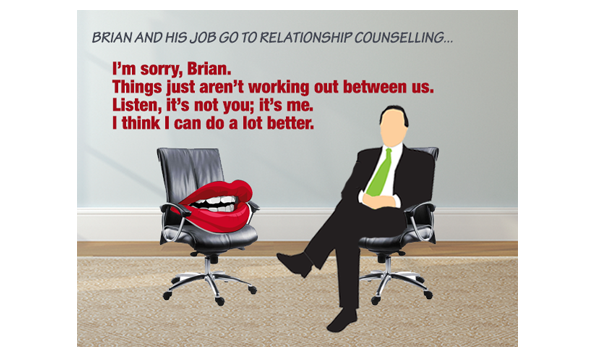When Your Job Wants to Break Up With You

Like the toy characters in Pixar’s animated film series Toy Story, imagine what our jobs would say about us when nobody is around. Better yet, imagine being able to have conversations with all the jobs in your company. What would they say?

If our jobs could talk, we would get to hear the real story. We could listen to them outline in extensive detail the precise composition of knowledge, skills, experience, values and behaviours that are needed to thrive in the organisation. Each job would know the most direct path to hit its KPIs and the kind of person who would gel with the team culture. They would know exactly which job occupants had the “right stuff” — and which ones didn’t.
If jobs could talk, we probably wouldn’t be too surprised to learn that many of them are unhappy in their current relationships. We would hear things like:
- “My partner just doesn’t understand me.”
- “He’s not a good personality fit for me.”
- “She’s too focused on the wrong goals.”
- “I need to be with someone more emotionally mature.”
Many jobs would want to see other people.

Poor Brian.
And it’s not simply because Brian is lazy, stupid or incompetent. Some jobs are scary, demanding, soul-destroying, stress-inducing lunatics who would drive anyone insane. You need to stay the hell away from some jobs. Fortunately, those are in the minority. There are many more cases where jobs and individuals just aren’t well suited to one another. For whatever reason, the chemistry isn’t there.
Career-fit, like marriage-fit, is all about compatibility. And it’s a tricky business, with a gazillion variables. In the absence of having jobs whom we can bring to life and have a civilised chat with over tea and crumpets, hiring managers and HR departments must do their best to understand the critical factors that lead to superior performance in a job. In other words, they need to know what the job needs — not just who the hiring managers have a good feeling about in the interview process.
For as long as companies have been recruiting, a major problem with the job interview is that hiring managers often have no idea what the job actually looks like. Or more to the point: hiring managers often think they know what the job looks like, but they don’t. Either due to personal bias, overconfidence in their interviewing ability, or flawed assumptions built into the job description, the hiring managers might be looking for a clone of John from the sales department when what they really need is someone more like Tina from the operations team. Other times, there's no ideal "one" whom the hiring managers are searching for — they're just waiting for any 'ol body to come along who can string a semi-intelligent sentence together.
It's important to remember something, though: Every job is unique and has unique needs. For example, there is no such thing as a single "best" personality profile for a salesperson that is perfect for every sales role in every industry. Research shows that a superstar performer in one sales role can be a dud in another. And it's precisely because jobs vastly differ in the types of skills and attributes that are required in order to be successful in the context of a very specific environment. Selling low-margin electrical equipment for a company of 100,000 people in China differs from selling up-market country real estate for a company of 10 employees in England.
Imagine bringing the job to the job interview.
With the job in the interview room, it would be able to whisper in your ear when it saw a candidate trying to pull the wool over your eyes. In spite of how attractive, charming, funny or intelligent some candidates might appear on the surface, the job would always be able to see right through the facade. The job can't be fooled: It knows who it needs. Sometimes, that person is the soft spoken, "under-the-radar-blink-and-you'll-miss-him" quiet achiever, and other times, she's the most in-your-face, "personality-to-the-maximum" boisterous rebel.
Our patented Position Benchmarking System is like having the job in the interview room. It allows the job to “speak for itself" and tell us what it needs for superior performance. With this process, you will be able to accurately measure:
What personal attributes are required for successThe job's intrinsic rewards and motivatorsThe competency mastery vital for the jobThe behaviours necessary to perform at peak levels.
The benchmarking process involves the help of an impartial expert facilitator working alongside people who know the job best, combined with state-of-the-art assessment tools, which are used to build a profile of the ideal candidate. From there, it's simply a case of comparing which candidates best fit the job profile and using the information in the profile to make more informed hiring decisions.
> Learn more about the Job Benchmarking Process here.
Limited Benchmarking Opportunity
We are currently looking for companies in Australia and New Zealand to help us replicate benchmarking research projects from other countries and publish some local research. As part of these research projects, we will help by subsidising some of the assessment costs, which will represent significant savings for the companies involved. The jobs that we are interested in identifying the ideal benchmark for will be from a range of industries, including (but not limited to) insurance, banking, legal, professional services, sales, and telecommunications. If you are working in HR, recruitment or OD for one of these companies, or would like to register your interest to have a job benchmarked in your company from another industry, please email: "Benchmark Please" to research@dtssydney.com with your details and we'll send you further information!
Topics:
Human Resources
Theo Winter
Client Services Manager, Writer & Researcher. Theo is one of the youngest professionals in the world to earn an accreditation in TTI Success Insight's suite of psychometric assessments. For more than a decade, he worked with hundreds of HR, L&D and OD professionals and consultants to improve engagement, performance and emotional intelligence of leaders and their teams. He authored the book "40 Must-Know Business Models for People Leaders."

/Simon%20Sinek%20You%20Build%20Trust%20The%20Same%20Way%20you%20Fall%20In%20Love.png?width=374&name=Simon%20Sinek%20You%20Build%20Trust%20The%20Same%20Way%20you%20Fall%20In%20Love.png)
/8%20Warning%20Signs%20You%20Lack%20Emotional%20Intelligence.png?width=374&name=8%20Warning%20Signs%20You%20Lack%20Emotional%20Intelligence.png)
We Would Like to Hear From You (0 Comments)